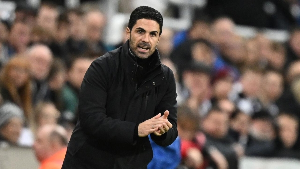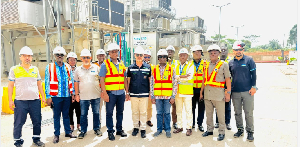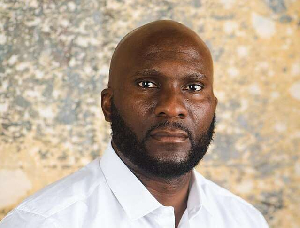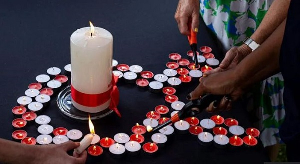Bringing Knowledge, Help And Hope To Ghana: Akufo-Addo Speaks From Hamburg
BY HERBERT KRAPA
He spoke for 1 hour 13 minutes, and after, got a standing ovation with cheers and applause from his audience for nearly that same time. It was his speech to the external branches of the NPP at its 3rd International Conference in Hamburg. As usual, he was passionate about education, skills training, jobs, structural transformation of our economy, and more. It was Nana Addo Dankwa Akufo-Addo.
On his highest priority: educating the people to be able to take advantage of our natural resources, in order to bring sustained development to our country and country people, Nana Addo said amongst many others that:
“If we, of the NPP, are to vindicate the principled conviction of our founding fathers over 60 years ago that multiparty democracy is the best vehicle to enhance the dignity of every Ghanaian and the development of our society, then we must fight with all the weapons at our disposal to win the enduring war against poverty. However, we can only win this war by first recognizing that we cannot continue deploying the same ineffective weapons of old and expect victory. Ghana cannot continue the folly of doing the same thing over and over again and expect different results. We need to break our future free from the shackles of the Guggisberg economic model of producing and exporting raw materials. Africa is probably the richest continent in terms of natural resources. Yet, those riches have not translated into prosperity for the African people. On the contrary, the African people are the poorest on earth. We have not been able to use our natural resources to transform the lives of our citizens because we have not prioritized the development of the most important ingredient in any nation’s development mix: the mind.”
“That is why I have made the issue of nurturing the intellectual property of the Ghanaian my highest priority. Education, education, education. Without education we shall sweat and toil in vain. For Ghana to industrialise, we must take a total look at the economic, organisational, administrative, legal, regulatory, technical, financial and even sociological conditions of Ghanaian industry. But beyond that, we must not compromise in our commitment to provide for every Ghanaian child access to quality education, regardless of the circumstances of his or her birth.”
“The education reforms of the late 1980s, which introduced the Junior Secondary School system as the first point of exit, merely ended up throwing out onto our streets each year an estimated quarter of a million school leavers without any form of basic, employable skills. This represents about half of the numbers that sit for the Basic Education Certificate Examination (BECE) and the West African Senior Secondary Certificate Examinations (WASSCE) at the two exit points, failing in their final papers. A recent survey showed that about 64% of JHS pupils cannot read or write. What this means simply is this: we have been banishing about half of our youth to a future of hopelessness and struggle. This is not the way to build a nation and we should work together to put a stop to this phenomenon of failure and hopelessness.”
“The least that a society can give its youth are education and skills for jobs. Without the foundation of quality education, the other two become a chanced struggle and the quality of tuition a child receives before the age of 16 can make or break his or her future. That is why I am saying that, under my presidency, the Junior High School level would no longer be the first exit point for education. We will introduce a policy that will make Senior High School part of the basic school system and, therefore, the first point of exit for every child in Ghana. Again, we are determined to tackle the critical issue of the kind of education that we offer to our future citizens. The future is for quality education. This means that at the heart of our education policy will be what we have called, 'Teacher First'. We are determined to put the needs of the teacher and hence the quality of tuition for our children first. Quality education will be at the very heart of the next NPP policy on education. We intend to enhance quality of education in every public school in Ghana in our overriding goal of building a new society of opportunities by committing, by legislation, a significant and constant percentage of our GDP to education. The current situation, which has seen the percentage of GDP devoted to education decreasing gradually since 2009 and spending in key social interventions, like the school feeding programme and capitation grant, suffering cuts do not show a nation serious about its future. Education is the key to unleashing the talents of our people. To coin a phrase, the freedom of the Ghanaian is meaningless without a deliberate policy to grow his or her intellectual property. We need to prepare our people and empower them with the confidence and skills to become champions in this new and exciting, competitive Africa.”
“Our education system and training institutions must thus be designed in such a way as to encourage and support this process of socio-economic transformation that will also necessarily embrace a strong attachment to technology. It is not for nothing that China mandates 40 percent of her secondary school students to do science. Science, technology, communication and information technology have become the structure of knowledge in the 21st century. The Asians are managing to embrace science and technology without losing the true essence of their culture. Japan is an excellent example of a culture that towers magnificently in technological splendour, yet preserves meticulously her indigenous norms and traditional values.”
“Our own indigenous respect for hard work and our ingenuity, our attraction to innovation and our sense of initiative, our practical creativity and capacity to adapt, in other words our instinctive technological knowhow and characteristic professionalism, our intelligence, are the only surefire means by which we can bring a radical, accelerated positive change to our country and to the lives of our people. The ingenuity of our artisans, craftsmen, cash crop producers the length and breadth of Ghana must be harnessed and taken to a higher level: the retrofitters of Suame Magazine in Kumasi, the textile weavers of the Ashanti and Volta regions, the fisherfolk along the coastal belt from Western, through Central, Greater Accra and onwards and eastwards towards Togo, the handicraft producers and horticulturists of the Eastern Region, the cocoa farmers and mineral producers of the Ashanti, Western, Eastern and Brong Ahafo Regions, the animal husbandry, tomato, rice and cotton producers of the Northern, Upper East and Upper West Regions could all benefit from technology, technology transfer, training and value addition to their products, to produce to global standards in a globalised world and enhance their livelihoods here in Ghana.”
“Our future competitiveness as a nation and our quest for advanced status as a nation are fated for a crash-landing without the major impact of science and technology. God willing, when we come back, we shall pursue a vigorous policy of science education that will put us on the path to real development. In the words of academics such as David Landes and Bethwell Ogot, the new ‘Wealth of Nations’ will not be measured in terms of capital, land and labour, but more in terms of knowledge and in this case, knowledge in science and technology will be key. And in all this, the motivated, well paid, quality teacher will be at the centre of our educational policy.”
“Nana Addo ties his education policy with transforming and expanding our economy. This is what he calls ‘creating a new society of opportunities’. Education, Skills and Jobs. He said that: “In terms of transforming our economy, I have dedicated my destiny to making my leadership of Ghana, God willing and the Ghanaian people so consenting, the period during which our economy is transformed from an exporter of raw materials and retailer of cheap imported goods to a modern, self-sufficient, surplus-producing industrialised one. The recent petroleum find offers us the perfect opportunity to create a petrochemical industry in Ghana, including monetising our gas to create a multi-billion dollar gas feedstock industry. We have the opportunity to make Ghana a regional centre for light manufacturing industry for a market of some 350 million people, by weaving together our numerous natural resources, like food produce, bauxite, iron ore, oil and gas, with our talents and energy to turn our nation into an economic powerhouse in Africa, generating full employment for our teeming youth. That is the strategic objective for which I shall be working. That is the road to sustained prosperity for our people.”
Nana Addo maintains that: “Ghanaian sense of enterprise, initiative and creativity, properly harnessed, can achieve this goal in the next decade.”
And by the way, Mr. Okudzeto Ablakwa, you will do yourself, your office, and your government a lot of good if you took the time to read what Nana Addo puts out before attempting to criticise him. We can belong to different sides of the political divide and still agree on intellectual policies that can drive our country forward and bring prosperity to the Ghanaian people.
Nana Addo believes we can transform Ghana and it can be done in our time. When you talk to him, his attitude is all about what we can do to get the basics and fundamentals right, so that our country can get onto a sustained development and growth pedestal.
This one too, Okudzeto Ablakwa and his NDC disagree?
hkrapa@gmail.com
General News of Friday, 17 June 2011
Source: HERBERT KRAPA












